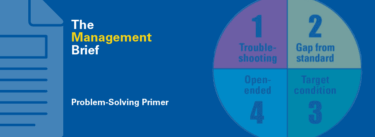As a subscriber to HBO, I enjoy the biographical movies that the channel produces.
One recent biographical movie touched me deeply and made me reflect again on how easy it is for anyone to rush to conclusions or solutions without truly understanding the facts, a fundamental concept of lean thinking and practice. “Paterno”, the story of Joe Paterno, the legendary coach of Penn State football who died in the middle of the scandal around Jerry Sandusky (former Assistant Coach under Paterno) and his sexual abuse of teenage boys. The movie was interesting in that it chose to focus primarily on the final few weeks of Joe Paterno’s life, shuttling between two major characters – Joe himself (and his family circle) and Sara Ganim the journalist who broke the sex scandal story and eventually became the third youngest recipient of the Pulitzer Prize for Journalism at 23 years old.
I grew up in central Pennsylvania in a small town called Lewisburg, just an hour east of State College, home of Penn State University. Penn State’s main campus is situated nearly smack dab in the middle of the state which makes it remote to any real metropolitan area (both Pittsburgh and Philadelphia are 3-4 hours away). So everyone like me, who grew up in central Pennsylvania and who was a sports fan, looked to Penn State for “big league” sports and nothing was bigger than football in Pennsylvania. And no one loomed larger than “JoePa” as the man that had led Penn State football since I was a little kid in 1966.
The love of JoePa was nearly universal in central Pennsylvania. We loved him not only for winning (two national championships and 18 bowl victories), but because we believed that he focused on developing the players as people, knowing that while some would be successful in pro football, but most would have to do other things in life. Joe was unique because his graduation rate was 80% with no achievement gap between black and white players. In central PA, dare I say, this guy was “god”.
As I grew older, and worked at Toyota and then LEI, I often reflected on JoePa as an example of Lean Thinking and Practice. He focused on developing his people as we do in lean. He did not allow his players to wear their names on the backs of their jerseys because he did not want the players or the fans to focus on individual effort, but rather on the effort of the team. He challenged players to do more with their lives beyond football. All these were elements of the Toyota Way.
So when the scandal broke about Jerry Sandusky no one, including me, could believe that Joe Paterno had anything to do with it. How could he?
But Sara Ganim learned otherwise over time. When she first broke the story in the Harrisburg Patriot-News, six months before it went national, students and fans of Penn State couldn’t believe it. In fact, they looked at Sara, a recent graduate of Penn State, as a betrayer of the school. And everyone, in their haste to protect the image of the school and their beloved JoePa chose to believe that Paterno could not have “known”. Penn State students, in support of JoePa, rioted in the streets.
Ganim’s doggedness to expose the truth uncovered the real facts behind the case. Later, an independent investigation by former FBI Director Louis Freeh commissioned by the Penn State Board of Trustees revealed that Joe, along with many other university leaders, had in fact had knowledge of Sandusky’s transgressions. They validated Ms. Ganim’s findings.
Bias is a word that has been in the vernacular a lot lately – gender bias, racial bias. In this case, I suffered from JoePa bias.
Lean offers an answer to this tendency: make judgments and decisions based on the facts which are informed by being at the gemba. Its interesting to watch the Paterno film with this in mind. Most of the screen time of Sara Ganim is at Penn State investigating the facts of the case, not in her office at the Patriot-News in Harrisburg. This is brilliantly juxtaposed with the Penn State/JoePa side of the story, where most of the characters spend their time talking at home or in offices, not about the need to find out the facts of the truth, but rather about how they should protect themselves or “spin” the story.
There is much for the lean community to learn from this. And in general from good investigative journalism. It’s an interesting (and recently assailed) profession. Yes, you can learn techniques in journalism school about how to write a lead, but most good journalism that wins Pulitzers comes from deep investigation learned in the field, seeing the gemba, talking to those involved, then analyzing the facts based on that.
We could use more of this type of journalism in our 24 hour news cycles, but I also think the business world and the leaders in it could use more understanding of the gemba.
I’ve recently been working with a team of top executives of a large company. It is a great company – most of its executives have served there for more than 25 years. We have worked with them on problem solving, and what they have discovered through this exercise is that their 25 years of experience have engendered a culture of “knowing the answer” without knowing the facts of the problem. They are in an industry where the gemba, or job site, is a dynamic environment that changes daily. But, they tend to make judgments, not based on a deep, personal study of the current state of the gemba, but rather on historical knowledge or experience. Let’s call it “Experience Bias”.
So as leaders we need to do “Mindful Observation” of the gemba before jumping to solutions and base our decisions on what we learn from that, not what we think we know.
I thought Joe Paterno was the greatest college coach that every lived. On the surface, the results seemed to prove that – 409 wins. But Sara Ganim, through her incessant pursuit of the facts, proved me wrong. It was truly a sad day for me – the victims of this tragedy suffered so long because many people could only look at part of the story.






